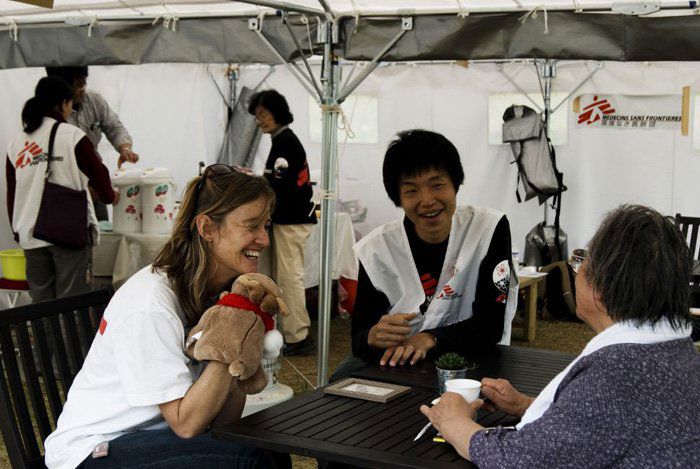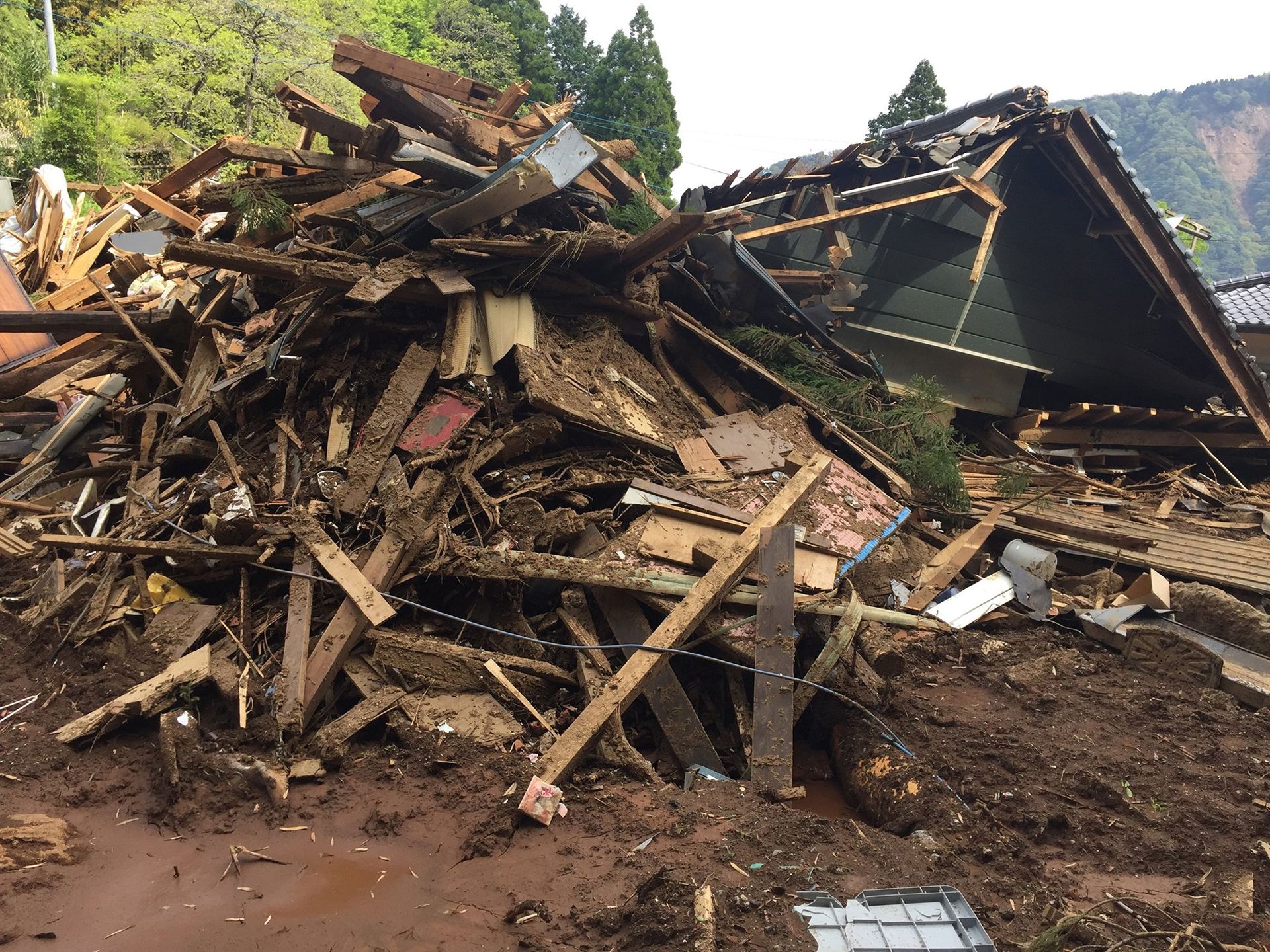MSF has begun to support the construction and rehabilitation of two clinics in the disaster-affected area of northeast Japan, where MSF staff have been working for the last three months.
While the government’s recovery efforts continue following the devastating March 11th earthquake and tsunami, it will be several years before permanent medical facilities to replace those destroyed in the disaster are completed.
In Minami Sanriku, Miyagi prefecture, MSF will assist with the design, construction and equipping of a primary-level clinic that will serve the local population of 23,000. The facility is expected to be used for between three to five years until a permanent new structure is built.
In Taro in Iwate prefecture, MSF will assist in the refurbishment and equipping of a similar clinic located in a hotel. Again, the clinic will be used as a bridging facility for the town’s population of 5,000 until a permanent one is completed.
In both places, the main primary-care facilities were totally destroyed by the huge tsunami that swept into northeast Japan after the 9.0 magnitude earthquake.
An MSF architect has visited the proposed sites and will support the design and supervise the construction process.
“We have submitted our plans for the facilities in Taro and Minami Sanriku and are working closely with local medical authorities to ensure the two clinics meet the needs of the local population,” said MSF architect Kunio YAMAZUMI.
In Minami Sanriku, the proposal is for a modular clinic that will be able to offer outpatient facilities, ear, nose and throat services, dentistry, pediatrics and the capacity for various examinations. In Taro, the services available to the local population through the clinic include general outpatient services and basic examination facilities.
In addition, MSF has delivered two 30-seater buses to authorities in Minami Sanriku to help transport patients from evacuation centres and temporary housing to medical facilities, including the Bayside Arena Clinic, where MSF is currently providing medical and psychological support services. MSF also delivered a vehicle specifically designed to transport disabled patients in the town of Taro and surrounding areas.
Raising awareness
MSF psychologists continue to engage in a range of outreach and awareness-raising activities in the tsunami-affected region, including distributing leaflets and giving information via a community radio station set up by evacuees.
Key topics discussed include identifying mental health issues, information for parents, stress management and where to seek psycho-social support.
MSF staff has also accompanied public health nurses to visit temporary houses and provide direct training while visiting patients, and contact has been made with a local nursery school, where discussions have taken place about providing school teachers and parents with some training and information about mental health.
“Unlike physical medical problems, mental health is harder to observe and quantify, and can therefore be under-estimated,” said Suzanne PETRIE, a MSF psychologist who has previously worked with traumatised populations in Pakistan and Jordan. “An entire community infrastructure has been destroyed so normal social support structures and activities are largely non-existent.”
Social support
Since an MSF ‘café’ staffed by a team of MSF psychologists was established near Bayside Arena in Minami Sanriku on April 27, 2,220 people have used the space, with more than 300 receiving some type of psychological intervention.
The café space provides an area where people can get refreshments and talk in an informal setting with mental health staff, who can then identify particularly vulnerable cases requiring further support and offer one-to-one counselling.
“Disasters like a tsunami alter peoples understanding about a lot of things - about what is safe, their hopes for their future, their relationships, and their community,” said SUZANNE, the psychologist.
“For most people, these reactions will naturally reduce with time, but a minority may require professional mental health help. This is when the reactions are particularly severe, persist and they are significantly impacting on the person’s ability to cope.”
“Providing information about normal reactions during this stage of the recovery process, developing awareness about ways of coping, having some services available for individual and group support, and developing the capacity of those who have contact with the community, such as doctors, nurses, teachers, and community workers, are important investments in the future well-being of this community.”
While the government’s recovery efforts continue following the devastating March 11th earthquake and tsunami, it will be several years before permanent medical facilities to replace those destroyed in the disaster are completed.
In Minami Sanriku, Miyagi prefecture, MSF will assist with the design, construction and equipping of a primary-level clinic that will serve the local population of 23,000. The facility is expected to be used for between three to five years until a permanent new structure is built.
In Taro in Iwate prefecture, MSF will assist in the refurbishment and equipping of a similar clinic located in a hotel. Again, the clinic will be used as a bridging facility for the town’s population of 5,000 until a permanent one is completed.
In both places, the main primary-care facilities were totally destroyed by the huge tsunami that swept into northeast Japan after the 9.0 magnitude earthquake.
An MSF architect has visited the proposed sites and will support the design and supervise the construction process.
“We have submitted our plans for the facilities in Taro and Minami Sanriku and are working closely with local medical authorities to ensure the two clinics meet the needs of the local population,” said MSF architect Kunio YAMAZUMI.
In Minami Sanriku, the proposal is for a modular clinic that will be able to offer outpatient facilities, ear, nose and throat services, dentistry, pediatrics and the capacity for various examinations. In Taro, the services available to the local population through the clinic include general outpatient services and basic examination facilities.
In addition, MSF has delivered two 30-seater buses to authorities in Minami Sanriku to help transport patients from evacuation centres and temporary housing to medical facilities, including the Bayside Arena Clinic, where MSF is currently providing medical and psychological support services. MSF also delivered a vehicle specifically designed to transport disabled patients in the town of Taro and surrounding areas.
Raising awareness
MSF psychologists continue to engage in a range of outreach and awareness-raising activities in the tsunami-affected region, including distributing leaflets and giving information via a community radio station set up by evacuees.
Key topics discussed include identifying mental health issues, information for parents, stress management and where to seek psycho-social support.
MSF staff has also accompanied public health nurses to visit temporary houses and provide direct training while visiting patients, and contact has been made with a local nursery school, where discussions have taken place about providing school teachers and parents with some training and information about mental health.
“Unlike physical medical problems, mental health is harder to observe and quantify, and can therefore be under-estimated,” said Suzanne PETRIE, a MSF psychologist who has previously worked with traumatised populations in Pakistan and Jordan. “An entire community infrastructure has been destroyed so normal social support structures and activities are largely non-existent.”
Social support
Since an MSF ‘café’ staffed by a team of MSF psychologists was established near Bayside Arena in Minami Sanriku on April 27, 2,220 people have used the space, with more than 300 receiving some type of psychological intervention.
The café space provides an area where people can get refreshments and talk in an informal setting with mental health staff, who can then identify particularly vulnerable cases requiring further support and offer one-to-one counselling.
“Disasters like a tsunami alter peoples understanding about a lot of things - about what is safe, their hopes for their future, their relationships, and their community,” said SUZANNE, the psychologist.
“For most people, these reactions will naturally reduce with time, but a minority may require professional mental health help. This is when the reactions are particularly severe, persist and they are significantly impacting on the person’s ability to cope.”
“Providing information about normal reactions during this stage of the recovery process, developing awareness about ways of coping, having some services available for individual and group support, and developing the capacity of those who have contact with the community, such as doctors, nurses, teachers, and community workers, are important investments in the future well-being of this community.”



